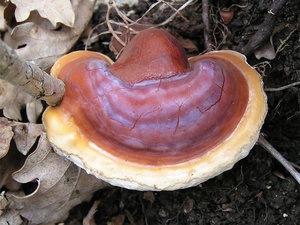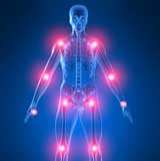
Pinyin: Ling Zhi Latin: Ganoderma Lucidum
Physical Characteristics
Lingzhi is a polypore mushroom that is soft (when fresh), corky, and flat, with a conspicuous red-varnished, kidney-shaped cap and, depending on specimen age, white to dull brown pores underneath. It lacks gills on its underside and releases its spores through fine pores, leading to its morphological classification as a polypore.*
Common Name
Ling zhi, Ling Chi, Lin Zi, Mushroom of Immortality, Reishi Mushroom
Family
Traditional Chinese Medicinal (TCM) Uses*
Derived from the cap and stem of the mushroom. The active constituents are thought to include both beta-glucan polysaccharides and triterpenes. Reishi mushroom is used as an immune stimulant by patients with HIV or cancer. Extracts of Reishi can stimulate macrophages and alter the levels of TNF and interleukins. In clinical studies, Reishi increased plasma antioxidant capacity and enhanced immune responses in advance-stage cancer patients. Reishi was also shown to inhibit platelet aggregation. Studies done in rats have shown that reishi extract may alleviate chemotherapy-induced nausea. Adverse events reported include dry nose and throat, nausea, vomiting and other GI symptoms. Theoretically, Reishi can interfere with the actions of immunosuppressants, anticoagulants, and certain chemotherapeutic agents. Purported uses: Fatigue, High cholesterol, HIV and AIDS, Hypertension, Immunostimulation, Inflammation, Strength and stamina, Viral infections.*
Lingzhi may possess some anti-tumor, immunomodulatory and immunotherapeutic activities, supported by some studies on polysaccharides, terpenes, and other bioactive compounds isolated from fruiting bodies and mycelia of this fungus (reviewed by R. R. Paterson). However, the efficacy of these compounds in the treatment of cancer has not yet been shown in clinical trials. Moreover, as with any herb, variation between preparations and potential negative side effects cannot be ruled out. It is understood as adaptogenic, anti-allergenic and anti-hypertensive due to the presence of triterpenes. Apart from these properties, lingzhi has been found to be anti-inflammatory, antiviral, anti-parasitic, anti-fungal, antidiabetic, anti-hypotensive, and protective of the liver. It has also been found to inhibit platelet aggregation, and to lower blood pressure, cholesterol and blood sugar.*
References
Source: Ganoderma Lucidum Reishi Mushroom Sloan Kettering Cancer Center; Lingzhi
Natural dietary supplements are designed to offer the body support to promote health, harmony, balance and overall well being.*

 Get Well Natural, LLC
Get Well Natural, LLC  Kidney Function & Regeneration Health
Kidney Function & Regeneration Health  Platelet & Blood Cell Health
Platelet & Blood Cell Health  Prostate, Flow & Function Health
Prostate, Flow & Function Health  General Mind & Body Health
General Mind & Body Health  Heart, Cholesterol & Cardio Health
Heart, Cholesterol & Cardio Health  Allergy-Free Body
Allergy-Free Body  Anxiety & Stress
Anxiety & Stress  Blood Platelet Counts & Function
Blood Platelet Counts & Function  Blood Pressure Health
Blood Pressure Health  Kidney Function Health
Kidney Function Health  Immune System Health & Balance
Immune System Health & Balance  Prostate & Urinary Health Function
Prostate & Urinary Health Function  Blood Sugar Balance
Blood Sugar Balance  Cardiovascular Heart Health
Cardiovascular Heart Health  Detoxification & Healthy Cells
Detoxification & Healthy Cells  Women's Health
Women's Health  Liver Regeneration
Liver Regeneration  Pain-Free Body
Pain-Free Body  Water & Air Filtration
Water & Air Filtration 


